

Explanatory Essay
Explanatory essay generator.
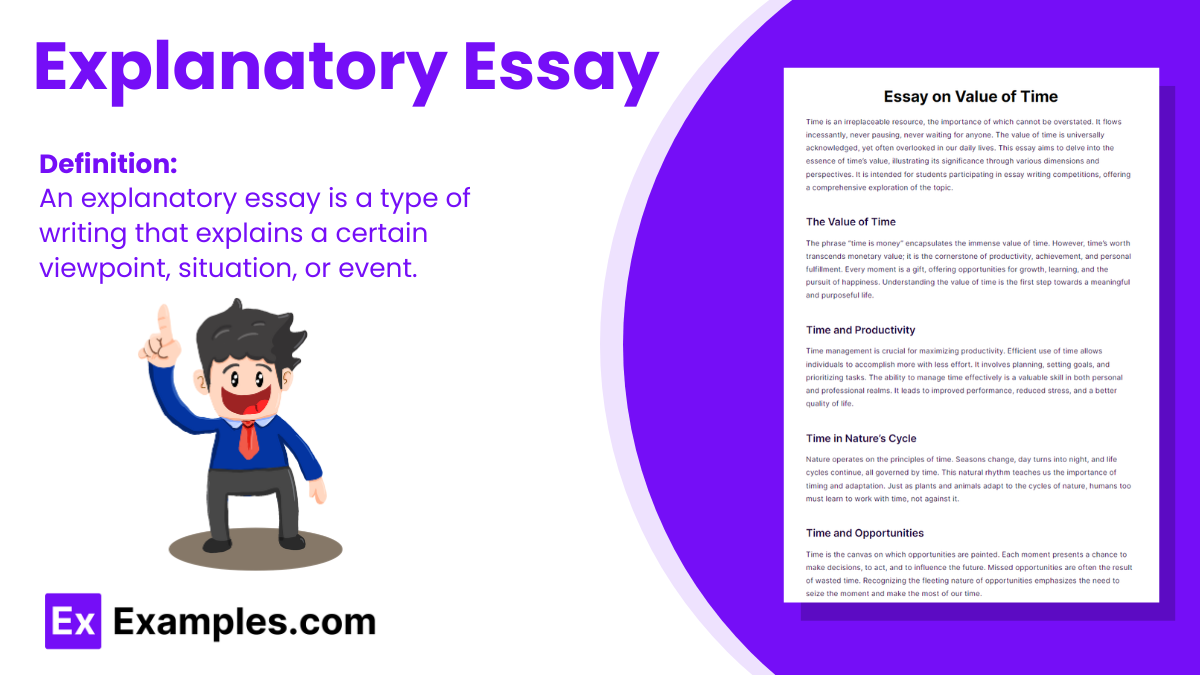
Essays Writing For a lot of students this word seems to get them to react in a very informal manner. In a way that they perceive this word or this activity as punishment from their professors. When it should not be seen as such. But what about you? What is the first thing that you can think of when you hear the word essays? For those who have gone through this type of discussion, you may have a different type of reaction compared to the majority of the population. Going back, we know that each kind of essay plays a different role and each essay has its own definition and uses. Of course we are not here to talk about the other types of essays except for the explanatory essay, also known as an expository essay. You know that an explanatory essay is also called an expository essay, But what is it about this kind of essay that makes it different from the rest? We know that there are uses for each but what about this? Is it from its term to explain? Are you curious enough to know what do you think this is about? If you are, check the article right now for more.
What is an Explanatory Essay?
An explanatory essay is a type of writing that explains a certain viewpoint, situation, or event. Unlike argumentative essays, which aim to persuade, explanatory essays focus on presenting information in a clear and straightforward manner, allowing readers to understand the topic without the writer’s bias. The goal is to explore a topic in detail by examining various perspectives and providing evidence, such as facts, examples, and statistics, to support the explanation. This essay type encourages critical thinking and research skills, as the writer must thoroughly understand and convey complex information to the audience effectively.
How to Write an Explanatory Essay
Here’s how to craft an effective explanatory essay:
- Understand the Prompt: Begin by thoroughly understanding the essay prompt or question. Identify the key aspects of the topic you need to explain.
- Choose a Topic: If you have the freedom to choose your topic, select one that is interesting and has enough information available for exploration.
- Conduct Research: Gather information from credible sources to gain a comprehensive understanding of your topic. Take notes on significant facts, statistics, and perspectives.
- Create an Outline: Organize your main points and evidence into an outline. This will serve as a roadmap for your essay, ensuring a logical flow of information.
- Write the Introduction: Start with a hook to capture the reader’s interest, followed by background information on your topic. Conclude the introduction with a clear thesis statement that outlines the main points of your explanation.
- Develop Body Paragraphs: Each body paragraph should focus on a single aspect of your topic. Start with a topic sentence that introduces the paragraph’s main idea. Provide evidence and facts to support your points, and explain how this information contributes to understanding the topic.
- Craft a Conclusion: Summarize the key points discussed in your essay and restate how they contribute to a deeper understanding of the topic. Avoid introducing new information in the conclusion.
- Review and Revise: After completing your first draft, take time to review and revise your essay. Check for clarity, coherence, and logical progression of ideas. Ensure that your essay adequately explains the topic without expressing personal opinions.
- Edit for Grammar and Style: Carefully proofread your essay for grammatical errors, punctuation, and spelling mistakes. Use clear and concise language to maintain the reader’s interest and understanding.
- Cite Your Sources: Properly cite all the sources you used to gather information. This adds credibility to your essay and avoids plagiarism.
Tips for writting an Explanatory Essay
- Begin with a clear understanding of the essay prompt to ensure your essay remains focused and relevant.
- Choose a topic that is both interesting and has sufficient information available for comprehensive exploration.
- Conduct thorough research from credible sources to gather diverse perspectives and facts about your topic.
- Create a detailed outline to organize your ideas and evidence logically, ensuring a coherent flow of information throughout the essay.
- Craft a compelling introduction that includes a hook to grab the reader’s attention, followed by background information on the topic and a clear thesis statement.
- Develop each body paragraph around a single main idea, using facts, examples, and explanations to support your points and enhance understanding.
- Ensure smooth transitions between paragraphs to maintain the flow of your essay and guide the reader through your explanations.
- Write a conclusion that summarizes the main points discussed, reinforcing the understanding of the topic without introducing new information.
- Maintain an objective tone throughout your essay, focusing on explaining the topic without inserting personal opinions or arguments.
- Review and revise your essay to improve clarity, coherence, and organization, and to ensure it adequately addresses the essay prompt.
- Proofread your final draft for grammatical, punctuation, and spelling errors to ensure your essay is polished and professional.
- Properly cite all sources used in your research to lend credibility to your essay and avoid plagiarism.
- Use clear and concise language to convey your explanations, making complex information accessible and understandable to your audience.
Important Steps for a Strong Explanatory Essay Conclusion
Creating a compelling conclusion for an explanatory essay is crucial for leaving a lasting impression on your readers. It’s the final chance to reinforce your thesis and the insights you’ve shared throughout your paper. Here are essential steps to ensure your conclusion is powerful and effective:
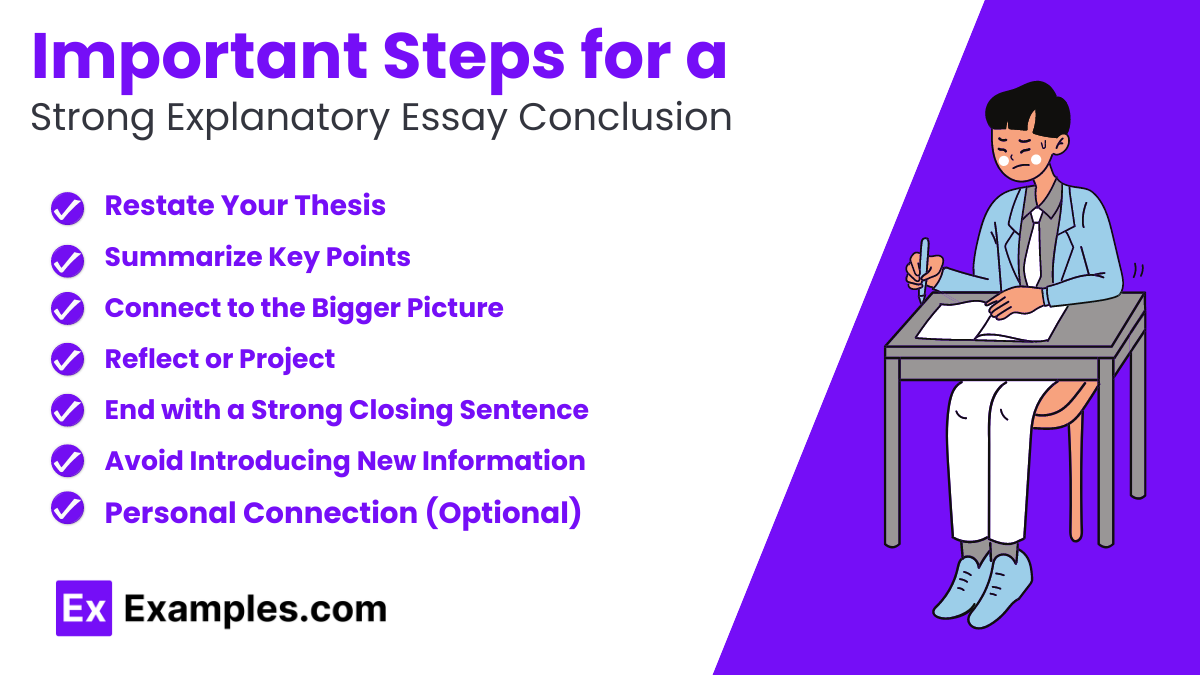
Download This Image
Restate Your Thesis: Start by rephrasing your thesis statement. This reminds readers of the main argument of your essay without repeating it word for word. Ensure it reflects the discussion and evidence presented in your essay.
Summarize Key Points: Briefly summarize the key points you made throughout the essay. Highlight the most compelling evidence and how it supports your thesis. This recap helps readers recall your arguments and reinforces the essay’s overall message.
Connect to the Bigger Picture: Tie your essay’s insights to broader themes or implications. Discuss how your analysis contributes to understanding the topic at a deeper level or its relevance in a broader context. This can involve suggesting how your conclusions might apply to other situations or the implications for future research or policy.
Reflect or Project: Depending on your essay topic, you might choose to reflect on the significance of your findings or project future developments. Reflection can provide personal insights or lessons learned, while projection can speculate on how the topic might evolve.
End with a Strong Closing Sentence: Your final sentence should be memorable. It can be a call to action, a rhetorical question, or a profound statement that leaves the reader thinking. Aim for a closing line that encapsulates your essay’s essence while also pushing the reader to consider its implications further.
Avoid Introducing New Information: The conclusion is not the place to introduce new arguments or evidence. Stick to synthesizing the information already presented in your essay.
Personal Connection (Optional): If appropriate, you can briefly mention what the topic means to you or why it’s important on a personal level. This humanizes your conclusion, making it more relatable and impactful.
10+ Explanatory Essay Samples
- Explanatory Essay on My Favourite Sport
- Explanatory Essay on Road Safety
- Explanatory Essay on Responsibility
- Explanatory Essay on Time Management
- Explanatory Essay on Video Games
- Explanatory Essay on Value of Time
- Explanatory Essay on Tajmahal
- Explanatory Essay on Summer Vacation
- Explanatory Essay on Student Life
- Explanatory Essay on Trees
10+ Explanatory Essay Examples
1. animal explanatory essay.
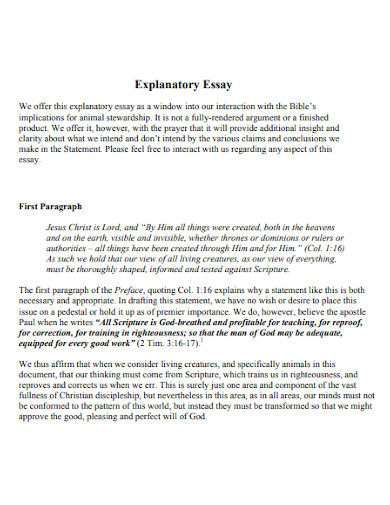
2. Explanatory Essay Checklist
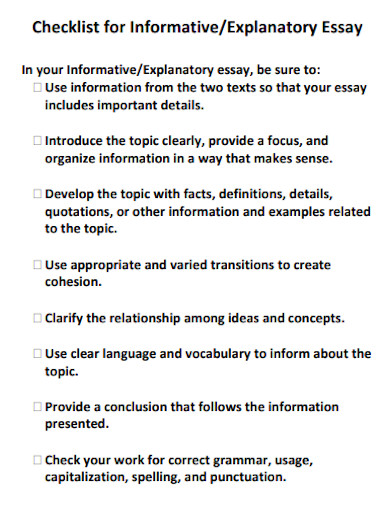
3. Internet Explanatory Essay
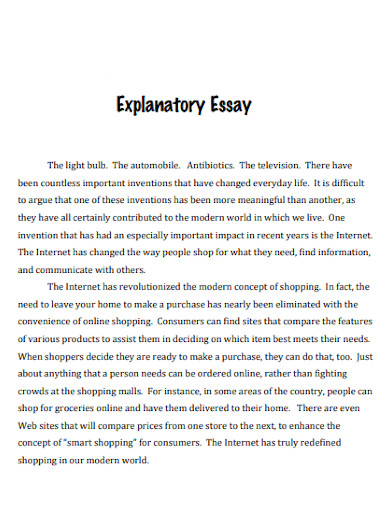
4. Explanatory Synthesis Essay
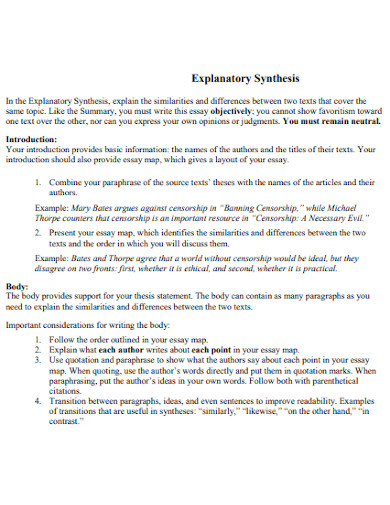
5. Explanatory Essay Sample
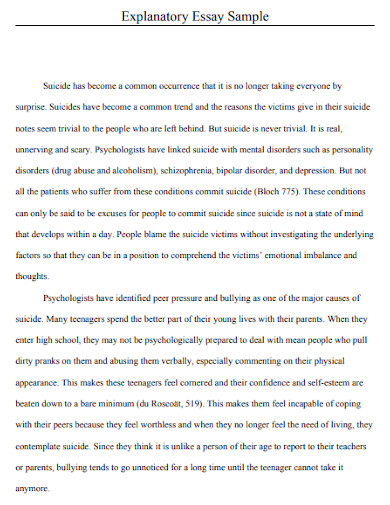
6. Informative Explanatory Essay
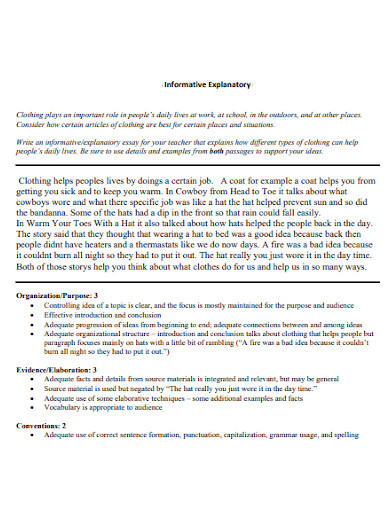

7. Baseball Explanatory Essay
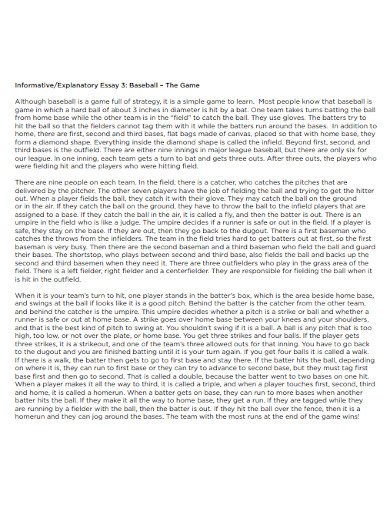
8. Student Explanatory Essay
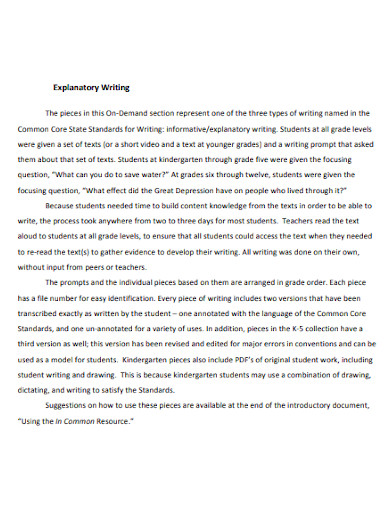
9. Education Explanatory Essay
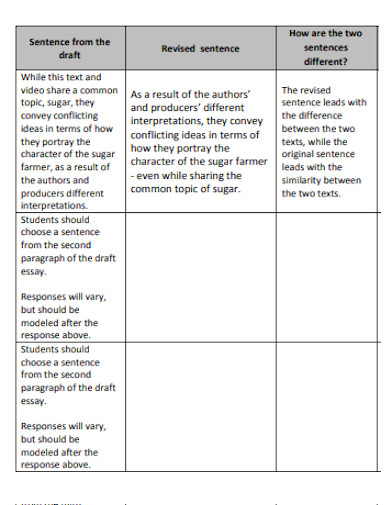
10. Explanatory Essay Analysis
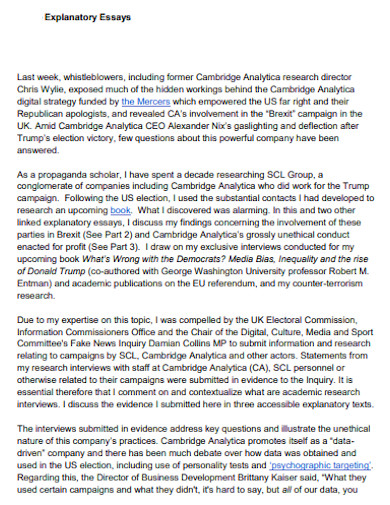
11. Descriptive or Explanatory Essay
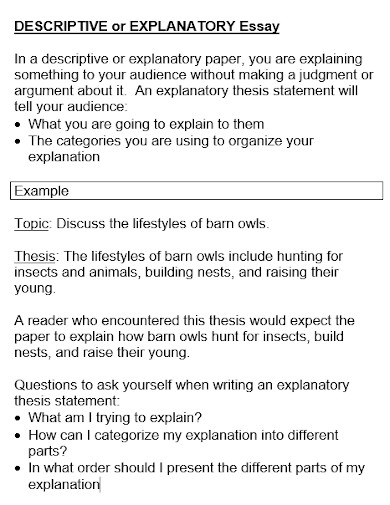
Purpose of an Explanatory Essay
An explanatory essay, often referred to as an expository essay, serves a dual purpose of exploring a topic and informing the audience. Its main goal is to provide a clear and detailed explanation of a subject, idea, process, or set of circumstances, based on facts and devoid of the writer’s personal opinions or biases. This type of essay is fundamental in academic settings as it fosters critical thinking, research skills, and the ability to communicate complex ideas in an accessible manner. Below are the key purposes of an explanatory essay:
- To Inform and Explain: The primary purpose is to educate the reader about a specific topic in a straightforward and logical manner. It aims to break down complex subjects into more understandable segments, ensuring the reader grasitates the full scope and context.
- To Analyze Concepts: Explanatory essays often delve into the analysis of ideas, processes, or phenomena. Through detailed examination, these essays present various perspectives and components of the topic, facilitating a deeper understanding.
- To Provide Clarity: One of the essay’s goals is to clarify any misconceptions or complexities surrounding the subject matter. It seeks to answer questions and resolve any ambiguities, making the topic accessible to all readers regardless of their prior knowledge.
- To Enhance Research and Writing Skills: Crafting an explanatory essay encourages students to conduct thorough research, evaluate sources for credibility, and organize their findings coherently. This process hones their ability to sift through information critically and present it in a structured and compelling manner.
- To Present a Neutral Viewpoint: Unlike persuasive or argumentative essays, the explanatory essay prioritizes neutrality and objectivity. It presents information without taking a stance, allowing readers to form their own opinions based on the facts provided.
- To Encourage Critical Thinking: By analyzing and explaining a topic from multiple angles, explanatory essays stimulate critical thinking in both the writer and the reader. They encourage questioning, exploration, and the synthesis of information into coherent understanding.
When writing the essay, what is best to avoid?
Avoid not editing your work, as well as avoid not doing extensive research. As this kind of essay requires the writer to do their research. Providing the fact and the ideas that an opinion from one writer is not enough to convince the readers. Regardless of what topic you may choose to write, you must have proof.
Is an expository essay and an explanatory essay the same?
Yes. An expository essay is also known as an explanatory essay. However, the term expository is more well known but they are the same type of essay.
This is all the information you may need as you plan to write your essay. Remember to always do extensive research on the topics you choose before you write. As well as ending your essays with a stronger statement or stronger opinion of the topic.
How Do You Write an Explanatory Research Paper?
To write an explanatory research paper, start with thorough research on your topic from credible sources. Organize your findings into a structured outline, categorizing information logically. Write your paper by explaining the research findings clearly, supporting your explanations with evidence, and maintaining an objective tone throughout.
How Do You Start an Explanatory Essay?
Start an explanatory essay with a hook to grab the reader’s attention, followed by a brief introduction to the topic that provides necessary background information. Conclude the introduction with a clear thesis statement that outlines the main points you will explain in the essay.
How Should I Start My Explanatory Essay?
Begin your explanatory essay with an engaging opening sentence or question that piques curiosity. Provide a concise overview or context for the topic, leading smoothly into a well-defined thesis statement that previews the essay’s key points or focus.
Can I Use “I” in an Explanatory Essay?
While it’s generally advised to maintain an objective tone in explanatory essays, using “I” might be acceptable if sharing personal experiences or observations directly relates to explaining the topic. However, this should be used sparingly and only when it enhances the explanation.
What Is the Difference Between Expository and Explanatory Essays?
Expository essays aim to inform and explain a topic to the reader, often involving a thorough analysis or breakdown of a concept. Explanatory essays focus on clarifying or elucidating a specific viewpoint, situation, or event, typically in a more straightforward and less analytical manner. Both share the goal of informing, but their approaches and focuses can vary
Text prompt
- Instructive
- Professional
Write an Explanatory Essay on the process of photosynthesis
Discuss the causes and effects of global warming in an Explanatory Essay
How to research effectively for an explanatory essay.
Crafting a thesis statement for explanatory essays.
Organizing your explanatory essay: Outline essentials.
Writing introductions that captivate in explanatory essays.
Developing coherent body paragraphs in explanatory essays.
Concluding your explanatory essay: Summarizing key points.
Importance of revision in the explanatory essay process.
Citing sources correctly in explanatory essays.

IMAGES
VIDEO